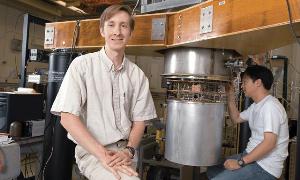Sep 25 2014
A physicist in Syracuse University's College of Arts and Sciences has received a major grant to support ongoing work in quantum information science.
 This is Syracuse University Associate Professor of Physics Britton Plourde. Credit: Syracuse University
This is Syracuse University Associate Professor of Physics Britton Plourde. Credit: Syracuse University
Britton Plourde, associate professor of physics, is the recipient of a $230,000 Defense University Research Instrumentation Program award from the Army Research Office (ARO). The award enables him to acquire a cryogen-free adiabatic demagnetization refrigerator (ADR) for the College's Department of Physics.
"Professor Plourde has achieved prominence through exacting and innovative work with his research team on micro-scale superconducting devices," says A. Alan Middleton, professor and chair of physics. "This new system allows for even more rapid development of devices for quantum information science."
Plourde says the new system will reach temperatures as low as 0.04 degrees above absolute zero (i.e., 40 millikelvin).
He also points out the ADR's first-stage cooling station, known as a cryocooler, is made by Cryomech, a local company that's a world leader in cryorefrigeration technology.
"This cryocooler provides fully integrated, closed-cycle refrigeration," says Plourde, an expert in condensed matter physics. "This is extremely important because it reduces our dependence on expensive cryogens for running low-temperature experiments."
One of Plourde's projects, led by IBM and funded by the U.S. government's Intelligence Advanced Research Projects Activity, has him combining multiple superconducting qubits with microwave resonators, in hopes of implementing a quantum algorithm.
Another project, funded by the ARO, involves him developing superconducting amplifiers and metamaterials, with an eye toward creating a scalable readout system for superconducting qubits.
Plourde also has been using National Science Foundation (NSF) funding to study the dynamics of magnetic-flux vortices in superconducting microwave-resonator circuits.
"The combination of this new ADR system with existing refrigerators at Syracuse will expand our low-temperature capabilities and allow us to cool down a greater variety of superconducting circuits," he says.
Much of Plourde's research involves developing components for quantum computers—machines that use quantum physics to solve problems much differently from traditional computers. Central to quantum computation is "superposition," a quality in which a particle may be in two states at once. Superposition often relies on low temperatures to remove thermal effects, which, in turn, tend to destroy quantum states.
"We're developing new microwave-resonator and detector circuits that allow us to measure the quantum states of superconducting circuits with high fidelity and low overhead, useful for scaling to much larger systems," Plourde adds.
A Syracuse faculty member since 2005, Plourde is the recipient of both an NSF CAREER Award and IBM Faculty Award. He earned a Ph.D. in physics from the University of Illinois at Urbana-Champaign, studying vortex dynamics in superconducting films, and then served as a postdoctoral scholar at the University of California, Berkeley. In 2013, Plourde was named editor-in-chief of Transactions on Applied Superconductivity, published by the Institute of Electrical and Electronics Engineers.
The Department of Physics has been educating students and carrying out research for more than 125 years. Graduate and undergraduate opportunities are available in fields ranging from biological and condensed matter physics, to cosmology and particle physics, to gravitational wave detection and astrophysics.
Source: http://www.syr.edu/